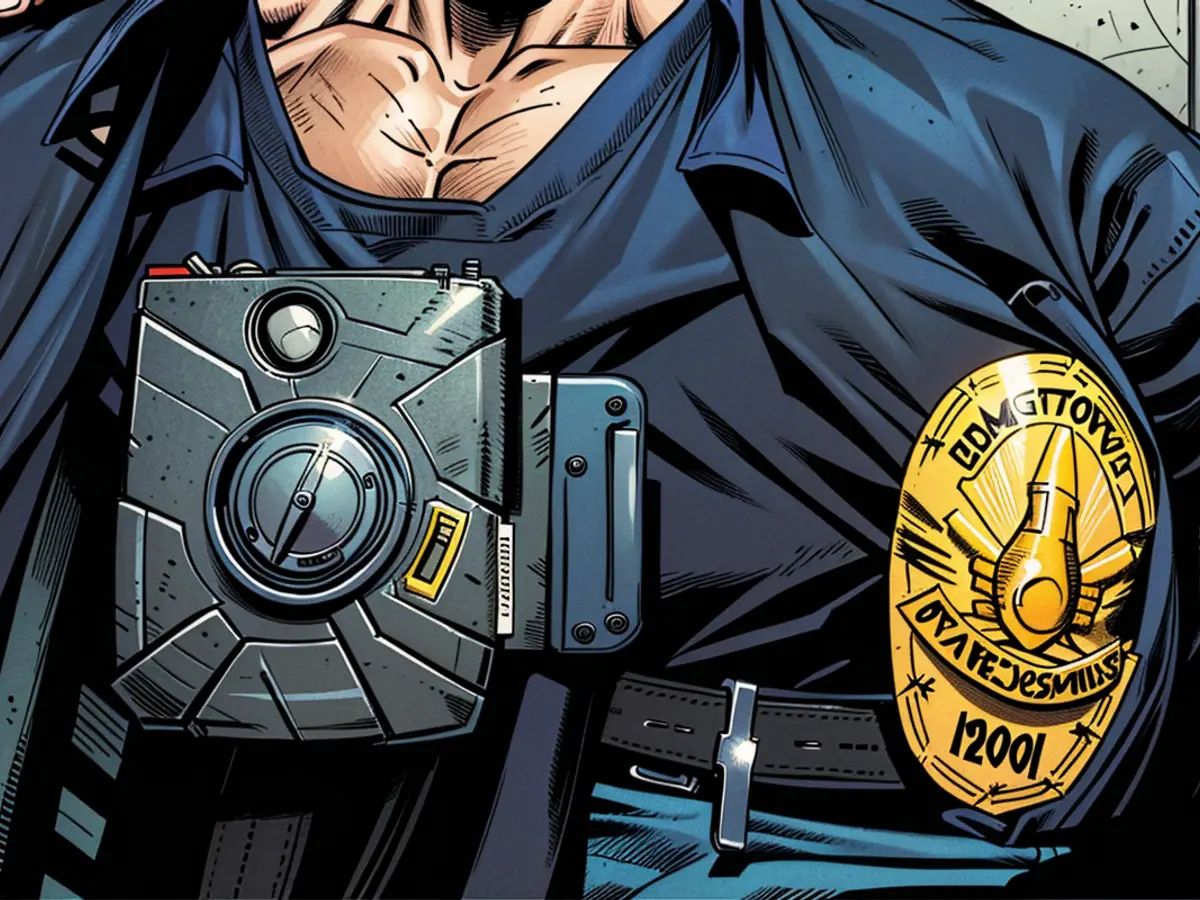With Harris advocating for the presidency, her past role as a prosecutor is under renewed examination.
Under the pressure from the late Democratic Senator Dianne Feinstein, who received a standing ovation for advocating for the death penalty at an officer's funeral, Harris, then 39, remained resolute.
In a piece published in the San Francisco Chronicle shortly after being elected as the city's first female district attorney in 2004, she affirmed her stance, "For those who wish for this defendant's execution, let me plainly state that there should be no exemptions from principle." She swore to the people of San Francisco that she was against capital punishment and would keep that promise, despite the emotionally charged nature of the case.
However, in 2008, Harris abandoned her long-held opposition to capital punishment when she announced her intentions to run for California's attorney general. She vowed to enforce the death penalty if elected, adhering to the law as she saw fit.
During her tenure as California's attorney general, she advocated for the implementation of a state law, which could have landed parents of chronically truant children in jail. However, during her 2020 presidential campaign, she expressed remorse over actual implementations, stating that it was never the law's intent.
Harris's shifting stance on this contentious topic is a mere reflection of her aim to strike a balance between being a tough-on-crime prosecutor and a forward-thinking politician.
Following the controversial police killing of Michael Brown in Ferguson, Missouri, in 2014, Harris launched a pilot program that required California Department of Justice field agents to wear body cameras. Despite this, she declined to support a more comprehensive measure favored by police reform advocates, which would have provided statewide regulations for the devices.
Years later, after the killing of George Floyd in Minneapolis, Harris stressed the importance of "independent investigations" into alleged police misconduct, citing the potential conflicts of interest when such investigations are conducted by local prosecutors. However, during her time as California's AG, she refrained from providing external scrutiny into several controversial police shootings within the state.
Her critics have criticized her for perceived inconsistencies, labeling her a "shape-shifter" or a "chameleon," as Republican vice presidential nominee Sen. JD Vance repeatedly suggested. However, Harris' supporters view her as an open-minded leader who is not afraid to change her stance in light of new evidence.
Brendon Woods, the current chief public defender in Oakland, California, where Harris began her career as a prosecutor, observed her evolution and stated, "People can evolve."
When questioned about her shifting stances during a CNN interview in August, Harris responded, "My values have not changed."
James Singer, a spokesperson for the Harris-Walz campaign, reiterated, "Throughout her entire career, Kamala Harris has fought to protect citizens and hold wrongdoers accountable. She has tackled predators, rapists, abusers, fraudsters, and gangs to bring justice to the people, and she will continue to do so as the President of the United States."
Confronted about Harris's shift on the death penalty, a Harris aide asserted that the role of the attorney general differs from that of the district attorney, and Harris complied with state law as AG.
The prevalent issue of racial disparities in the criminal justice system prompted Harris to pursue a career in prosecution in the first place.
"I grew up recognizing the disparities, injustices, and biases in the criminal justice system," Harris stated during an MSNBC town hall in 2019. "I told my family and friends that if we intended to reform these systems, we ought to be present where the decisions are being made. That's why I chose to engage in this work, and I am proud of the work I accomplished."
As a prosecutor, Harris adopted a "smart on crime" approach to law enforcement, encompassing initiatives like the creation of a program that directed non-violent offenders towards job training and away from prisons, and the public disclosure of statewide criminal justice data to foster government responsibility.
One of Harris' most daring actions as district attorney was the establishment of a program designed to keep young people out of jail or prison by ensuring their attendance in school.
"I believe a child going without an education is akin to a crime," she said during a San Francisco's Commonwealth Club speech in 2010. "So I decided to prosecute parents for truancy."
Although she never imprisoned anyone, she later stated that her program served as the basis for a law making it a criminal misdemeanor for parents to allow their kindergarten-through-eighth-grade children to miss more than 10% of classes without valid reasons. Those found guilty could face fines or up to a year in jail.
Testified about the matter, Harris discussed it with the state senate. She stated, "Via the prosecutor's office's influence, we wield an exceptional leverage - a reward and a penalty. The reward being the encouragement of good conducts. And the penalty outlining what repercussions or severe penalties will ensue when these good conducts... aren't adhered to."

Upon the bill's passing in 2010, some district attorneys took action. Subsequently, numerous parents have been apprehended or even incarcerated by other prosecutors, allegedly for permitting their children to skip too many classes, as per local government announcements.
Among these parents were Ayman Haddadin and his wife, Alice, residing in Orange County, south of Los Angeles. In 2011, they were accused by local authorities of allowing their middle school-aged child to accumulate 12 unexcused absences in a single academic year, neglecting to respond to notifications or attend meetings concerning the issue, and permitting absences in years prior.
In an interview with CNN, Ayman Haddadin revealed that his son suffered from chronic allergies, frequently worsened at school, hence the absences.
"If he can't breathe, he can't function," he said.
Despite attempting to address the issue with school administrators, Haddadin informed CNN, police besieged their residence shortly after dawn and took him and his wife, still in their nightwear, into custody. They were handcuffed and led away, he recounted, and details of their arrest were sensationalized in local media reports.
The spectacle, he said, left a lasting impact on his entire family.
"I remember being absolutely terrified," his now-adult son, Connor Haddadin, who had accumulated the absences, shared. "It was incredibly wrong and traumatic."
The case against the Haddadins was ultimately dismissed. A representative from the Orange County District Attorney's office confirmed that the case against the Haddadins is sealed and opted not to provide further comment.
Another parent arrested during the truancy sweep in Orange County in May 2011 announced that she was a single mother working two jobs to sustain her five children.
Following her detention, during which a photo of her in handcuffs was disseminated in local media, she claimed she lost one of her jobs as a line cook at a restaurant and her family experienced ostracization from the community.
"Another approach must be found," she complained. "It's inhumane."
Harris, who for years championed prosecutors' involvement in truancy cases, later expressed remorse about the "unforeseen consequences" that resulted in parents being prosecuted and incarcerated, stating, "That was never the intention."
However, Alice Haddadin disputed Harris' claims. "I can't consider that an unintended consequence because she formulated the law," she told CNN.
As California's Attorney General, Harris ascended to the most influential position to influence the state's criminal justice system from within, as she had promised to do as a young lawyer.
She was the state's "top enforcer" and had the latitude to shape policy and rectify wrongs as she saw fit.
During her presidential campaign, she consistently boasted about her tenure as the state's top enforcer, including how she allegedly "took on" large banks responsible for foreclosing on homes and "prosecuted" Mexican drug cartels and other transnational criminal organizations.
However, she was also criticized by detractors - some of who had previously supported her - for not doing enough during her tenure as AG.
In 2015, resulting from the widespread civil unrest in the aftermath of the police killing of Brown in Ferguson, Missouri the previous summer, Harris mandated that special agents working for the state Department of Justice had to wear body cameras while on duty.

Nonetheless, Harris declined to support a bill that aimed to impose statewide regulations throughout California.
Harris was skeptical of the proposed legislation, warning against an overly restrictive "one-size-fits-all" regulation.
Her cautious stance on the issue frustrated many criminal justice reform advocates, including those who supported her on other issues.
Bryce Peterson, a lecturer at John Jay College of Criminal Justice who has studied police body-cam policy and implementation across the nation, suggested that Harris' decision to not endorse the legislation may have been a missed opportunity to display leadership on the issue.
"You'll never convince police officers or agencies to change unless they're spurred in some manner," he said.
Another contentious area was Harris' apparent reluctance to utilize the wide-ranging powers of the AG's office to conduct independent probes into fatal police shootings.
As AG, Harris declined to support a 2015 bill presented by Democratic Assemblyman Kevin McCarty from Sacramento that would have mandated the state to conduct such probes, rather than county prosecutors who may exhibit bias due to their close working relationships with local law enforcement.
"The African American and civil rights community have been disappointed that (Harris) hasn't been more forceful on this," McCarty, a member of California's Legislative Black Caucus, told the Los Angeles Times in 2016.
Apart from not endorsing the bill, Harris declined to conduct independent investigations into controversial fatal police shootings in Los Angeles, Anaheim, and her former hometown of San Francisco, in which local officials declined to file charges against officers. The suspects in Los Angeles and Anaheim were unarmed; the man killed in San Francisco was armed with a knife.
In the aftermath of the shooting in Anaheim, the city's then-mayor, Tom Tait, appealed to Harris to conduct an independent probe during a press conference in which scores of protestors thronged the lobby of the Anaheim Police Department.
"I thought an impartial external inquiry was necessary to uncover the facts behind the situation," Tait expressed to CNN in September. "I figured this would've boosted the credibility and public faith in our judicial system."
Harris chose to steer clear of the matter, he mentioned.
McCarty revealed to CNN that although he voiced his discontent in 2016, Harris later played a significant role in drafting a law that necessitated the attorney general's participation in investigations involving fatal police shootings of unarmed suspects without a weapon.
"I commend Kamala Harris for paving the way for this to happen," he said.
Many years later, following her election to the US Senate and her initial presidential campaign, Harris emphasized the significance of such "impartial investigations" that she had previously chosen not to spearhead in her capacity as attorney general.
She expressed this in response to another high-profile police killing – one that sparked a global movement – that of Floyd in Minneapolis in 2020.
Addressing her Senate Judiciary Committee colleagues, Harris asked for their backing in passing a fresh federal law, one that would fortify independent review in instances where local prosecutors may have potential or actual conflicts of interest with probing the officers involved.
"As a former prosecutor," she asserted, "I understand that impartial investigations into police misconduct are vital."

In response to the criticism she faced for her shifting stance on the death penalty, Harris's campaign spokesperson defended her by stating, "The role of the attorney general differs from that of the district attorney, and Harris complied with state law as AG."
During her tenure as California's attorney general, Harris's opponents labeled her a "shape-shifter" or a "chameleon" due to her perceived inconsistencies in her policy positions.








